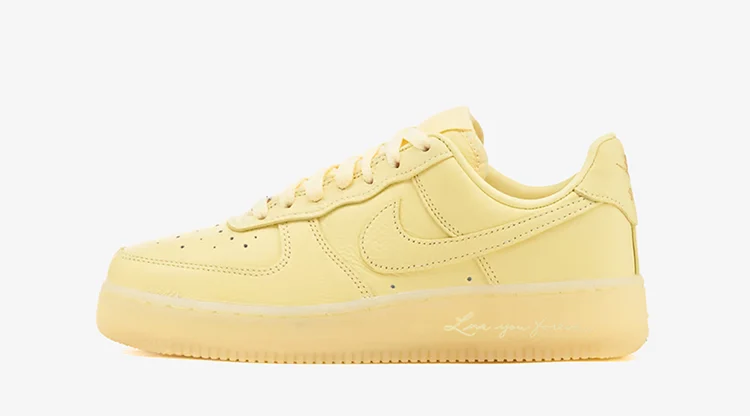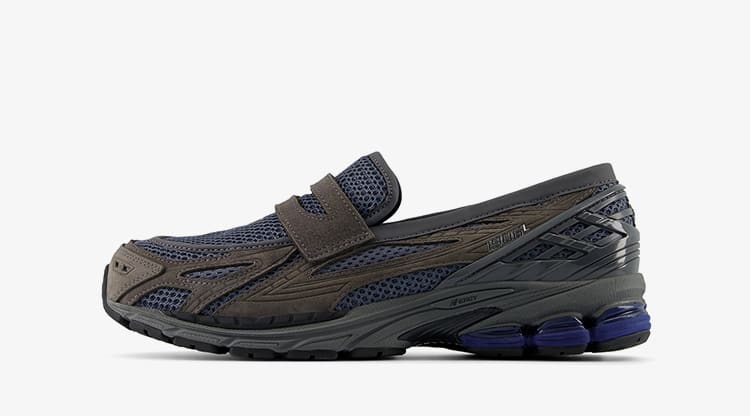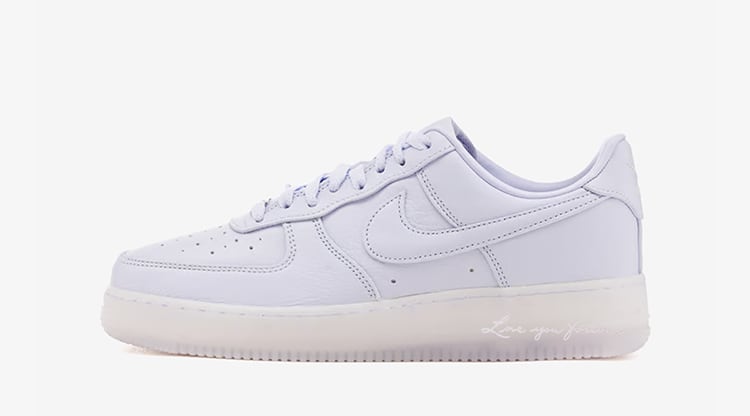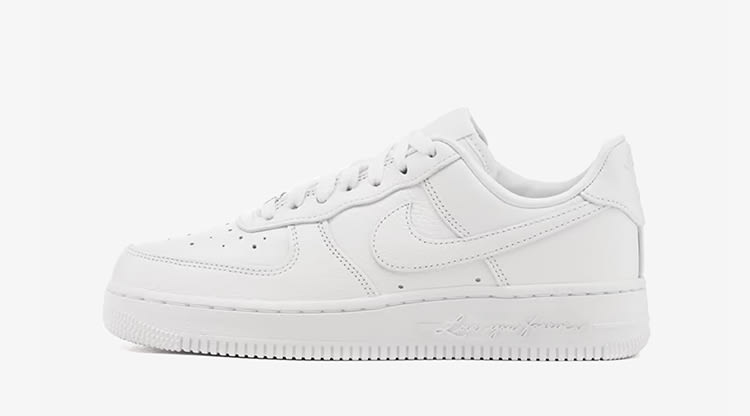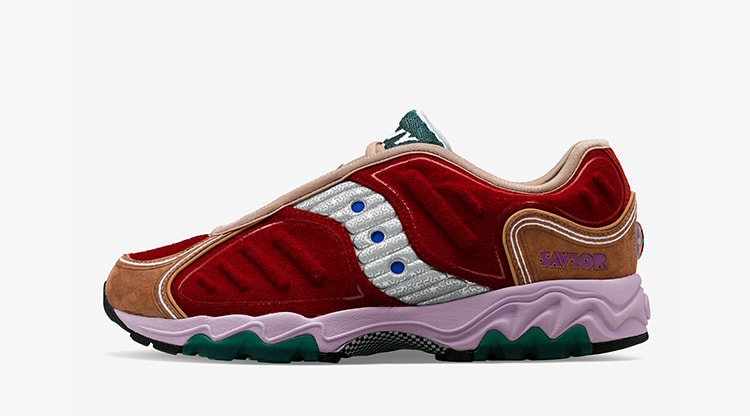Nike Air Force 1 Low SP Sneaker
Citron, Colbalt & SilverNew Balance U1906LAF Sneaker
MagnetNike Air Force 1 Low SP Sneaker
Purple, Colbalt, SilverNike Air Force 1 Low
White & ColbaltAdidas by Avavav Superfinger Superstar Sneaker
Better Scarlet & Off WhiteSaucony x Jae Tips Matrix Sneaker
MultiCollaborations
UrlfreezeShops X COLE BUXTON
Interviews
KEYRAH WAS ALWAYS ON THE AUX
Editorial
UrlfreezeShops CURATES: WINTER WARMERS
Culture
INSIDE THE PREMIERE OF 'AN ANATOLIAN ODYSSEY' @ MANGAL II
Editorial
UrlfreezeShops CURATES: Urban Functionality
Collaborations
UrlfreezeShops X PUMA X MANGAL II SUEDE SNEAKER
KEYRAH WAS ALWAYS ON THE AUX
10 December 2024Taking a trip back to her hometown, UrlfreezeShops spoke to Keyrah about her formative musical experiences, the impact of Birmingham on her taste and the art of DJing ahead of the launch of the Salomon XT-Whisper.
Renowned for her eclectic mixes and unpredictable DJ sets, Keyrah’s unique energy has been captivating crowds of music lovers in London and beyond over the past few years. Delivering a healthy dose of ‘90s and '00s flavour and brimming with unconventional blends, her expertise on the decks is underpinned by a deep and broad appreciation of music, with Keyrah playing everything from house, R&B and soul to broken beat and jungle. Having secured a Rinse.FM residency last year, Keyrah has gone from strength to strength, with a headline show at Phonox and sets at KOKO, Soulection and Boiler Room further cementing her status as one of London’s best selectors.
Born and raised in the Second City, Keyrah’s Birmingham roots have underpinned her distinctive approach to DJing and the city has proven to be a fertile ground in inspiring her on her musical journey. From her first experiences and connections to music through her dad to her first forays into DJing, the sonic environment of Birmingham has cultivated a deep appreciation of music in its myriad forms.
Heading back to Keyrah’s hometown, UrlfreezeShops caught up with the DJ ahead of the launch of the Salomon XT-Whisper to discuss all things Birmingham, unexpected blends and the art of DJing.
What originally led you to DJing? Had you always been interested in music from a young age?
I ended up falling into it because I decided that I wanted to work in music, but I wasn’t sure exactly what I wanted to do. My dad is a musician, so I’ve always had a relationship with music throughout my life. When I was younger, I used to play a few different instruments and dabbled within music practises. As I got older, my priorities switched a bit when I was at school, when I was starting to think about what jobs I could do. In-between years of college and sixth form, I decided that I wanted to pursue music properly. I went to study music business as I was really keen on putting on my own nights in Birmingham, cos I felt like there wasn’t really an in-between; it’s either your main clubs with bottle service or your raves. In London there is a lot of things between that. With that, I kind of fell into DJing really. I had a few mates who would say that they thought I’d be a good DJ, and I was always on the aux at house parties, DJing with two tabs on YouTube. So, I thought I may as well learn how to DJ if I was going to put on my own nights. I bought my own controller but felt like I needed more than that, so I went to DJ Gym in Birmingham and took a few lessons to learn how to use CDJs properly and the basics of how it works.
Why was the DJ Gym space so important to you when you were first getting into the artform?
It was so important because they had a proper DJing set up. It’s expensive and inaccessible to have this yourself when you’re starting out, unless you have access to a studio. For me, I knew that I needed to practice on this because once you’re out, actually DJing in clubs, there is an industry standard of equipment, so I needed to learn how to use it properly and be comfortable with it. It made sense to invest in those sessions, so I could really get to grips with the equipment. I didn’t know anyone who was a DJ, so there was no one for me to refer to. It’s the same as if you were to go to piano lessons, so I approached it like that. It’s an instrument at the end of the day.
You’re located in London now but grew up in Birmingham. What impact did the culture of Birmingham have on you?
In Birmingham there is a high percentage of Jamaican immigrants, who came to the UK as part of the Windrush generation. I’m half Jamaican, so for me, there is a lot of that culture within Birmingham and there are loads of dancehall and bashment parties. A lot of my friends and family’s parties when I was growing up had yardie DJs, who have a very specific way of DJing. The knock on effect of that is that those sounds then resonated into the clubs, so I heard a lot of dancehall there. When I was first going out, we’d go to places that would play a bit of hip-hop, rap, R&B, maybe some garage and bassline, which has a rich history in the Midlands. This would then go into funky house as well, which is something that I kind of took for granted when I moved to London. I remember saying “you guys don’t listen to bassline?!” There is a melting pot of sounds in Birmingham. There’s a lot of Asian immigrants in Birmingham as well, so it really is this mixture of Jamaican and Indian cultures. I grew up playing the dhol, which is an Indian drum, and I did bhangra dancing because of my primary school, so it really was a mixture of cultures growing up as a result of immigration. It wasn’t really until moving to London that I realised how the city had impacted my music taste. You don’t really realise how rich that melting pot is until you move somewhere else and its different, with other influences and factors.
I thought that if people didn’t want to book me, I’d go so hard that they wouldn’t be able to ignore me in the future.
After relocating from Birmingham to London, did you find that you had to recalibrate your approach to DJing? Was there a different attitude or reaction to your style of DJing?
I guess even though I play a variety of genres and always do my best to read the room, I still like to stick within my own boundaries of what I actually want to play. When I got to London, it was a completely fresh environment for me. Even though I knew a few people, it's an entirely different experience when you actually live there, so it was tough at first. I used to see line-ups that I wish l'd been booked for and question why I wasn’t on them. I had to learn not to take it personally and so as a result strived to make sure that every single set I played, I played to the best of my ability. I thought that if people didn't want to book me, l'd go so hard that they wouldn't be able to ignore me in the future. That was always the approach I had with it.
In past eras, music has often impacted style and subculture - how does music influence the way that you dress and your own specific sense of style? Has Birmingham’s music culture effected your taste in fashion?
The most obvious influence for me would have been around when I was 15 or 16, when I was super into sneaker culture, and sneakers go hand in hand with streetwear. Because I was listening to a lot of hip-hop with my friends in that specific era, from 2012-2016, the golden era of Action Bronson, Mac Miller, Wiz Khalifa, A$AP Rocky, Flatbush Zombies, like all of that sort of stuff, it kind of aligned with the way we dressed. There was a nice little community of people who were into the same sort of thing in Birmingham. We used to go to a night called MoHo, which was an old school hip-hop night, and this little community bubbled out of that. That was my entry point to it, and as I matured and stopped wearing just boy’s clothes, I started to explore more of my own personal style.
Having found dance music and DJing back when you were living in Birmingham, what were some of the pivotal moments that inspired you on your journey to becoming a DJ?
The way that I fell into DJing wasn’t really because I idolised other DJs, and it’s a funny one because I think that’s often the way that people end up pursuing it, you know? They have these moments where they say “I was at this party and seeing this DJ really changed my life”, and of course I’ve been in some spaces where I’ve heard amazing sets, but I kind of got into it because I love music. That might sound super cliché, but that’s really just the way that it went. I can pinpoint that connection to music at around age 8, wanting to go out and buy specific CD singles or albums and showing interest in wanting to play certain instruments. Then I fell in love with music again when I was 16, with those artists that I mentioned before and that spiralled into everything else. I enjoyed listening to music so much, that I kind of felt like I had to do something with it. One of the most important things with DJing, for me anyway, is that you can never stop being a fan of the music. That’s what keeps the love of the job alive. I loved constantly finding music and delving into new artists’ music, discovering new subgenres. Now everything is so experimental and crossing over into new territory. That’s why my style of DJing works, I think, because I don’t necessarily break everything down by genre. I’m not super well versed in genres on a granular level, so I end up meshing things together because they sound good rather than because of predefined genre similarities.
One of the most important things with DJing, for me anyway, is that you can never stop being a fan of the music. That’s what keeps the love of the job alive.
Your approach to DJing often sees you pairing tracks that shouldn’t work together on paper, but in practice sound amazing. What are you looking for when piecing together these unconventional blends?
It's kind of innate, so I put it down to my ear. Because I grew up playing a few instruments I feel like I find it easier to pick up on different elements of a track. I might pair two tracks together because they're in the same key or have similar melodies or bass lines. It's always quite unconventional because I rarely practice my sets. Someone will say "I love when you mixed this with this" and I'm like "same!" I'm just in the moment going off what I feel like is right, what the vibe is. It's kind of hard to pinpoint, because I'm not sat in my bedroom thinking "these two tracks will go great together." I do just do it in the moment, and it happens to work, that's why is say it's innate. Just knowing your music and the structure of the tracks is important to helping with that too.
When I first started DJing, I was so nervous, so I used to go to the studio and practice the first 15 minutes of a set so that I knew l'd be able to get through the initial part of my set and feel more comfortable. I just wanted to know that everything would start seamlessly, and I probably did that for the first couple of years that I started DJing. Now, I often don't even prepare what songs I'm going to play - which I guess can be a good or a bad thing! I'm not much of a prepper, I was always that person who was revising last minute before an exam at school!
You have performed on a number of radio stations throughout your career as a DJ – from your residency on Rinse.FM to The Lot in New York and Soulection on Apple Music 1. Do you feel like you bring a different energy to your radio performances compared to when you DJ a party?
Definitely. When it comes to radio, I approach it completely differently. That's where I’ll sit and have a slightly more thorough approach, because it's recorded and lives online. I'm curating a journey and I kind of approach it in the same way I would if I were building a song. When I started my residency with Rinse, I had to learn how to exercise a bit more freedom with my approach to radio sets because sometimes I’ll record them live. My live sets are the complete opposite of this process, where I have no idea what is coming next. For something like Soulection, I was super nervous because I was recording in front of a crowd but it was also for the radio. I approached it how I normally would, playing in front of a crowd, but if you'd have asked me how my dream Soulection set would have went, it would've been just me in the room and I could have painted the picture more clearly. It was great though, because it reassured me that I'm still able to curate the vibe that I want for radio, whilst taking the crowd into consideration.
You have recently launched your party in London and Birmingham, Misc;. Can you tell us a little about the concept behind Misc;?
Misc; is short for miscellaneous, and the idea is that – and I kind of hate using the term “genre-less” now because everyone uses it – the style and the curation of the night can take place in any format. So far they’ve been club nights in Birmingham at Lab11 and at The Pickle Factory and Phonox in London. They’re still different experiences in different venues, with very different approaches to lineups. In Birmingham it was a pretty standard structure with four DJs each playing an hour, whereas in London I played all night long and invited in DJs to play with me back-to-back. I want to make club nights that feel a bit different to the standard formula of a night that is happening at the moment. The idea is that I want them to take place in different spaces, so maybe do one in a listening bar that is really stripped back, and maybe another one where we do live music alongside it, which is what I’m going to do next year. This year has been a building exercise in establishing it, and next year will be taking it further.
